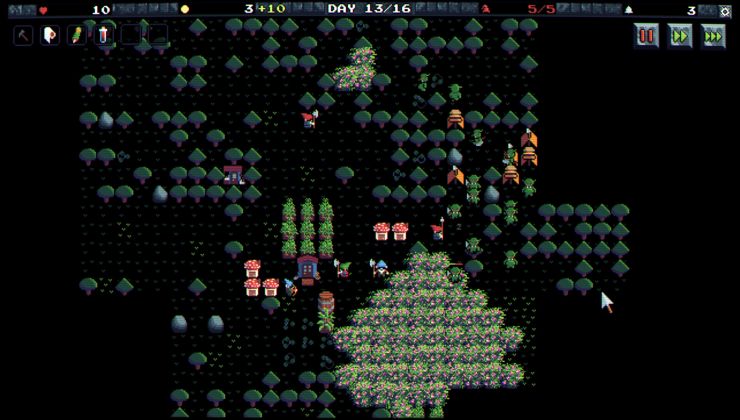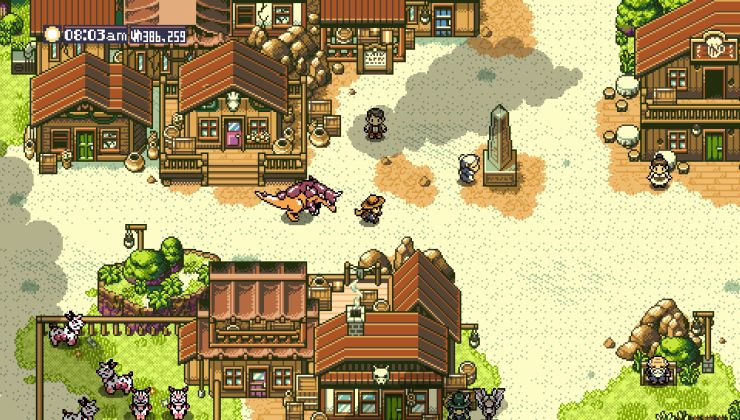For anyone who has been around Linux gaming for a while, the names Ryan "Icculus" Gordon and Ethan Lee will be well known as developers who port games to Linux and work on the tech behind tons of games.
Recently, our friends at Nuclear Monster spoke to both about Proton and the upcoming Steam Deck. Both giving a very different outlook on the future of Linux gaming, so it's interesting to see their perspectives on this considering how respected they both are for their work. For those who don't know Ryan Gordon maintains a lot of SDL, the MojoSetup installer (used by GOG), MojoShader, and ports to various platforms (not just Linux). Ethan Lee created FNA, the reimplementation of Microsoft's XNA, and Lee has probably ported more to Linux than anyone else (along with macOS too).
In the post with Ryan Gordon, it starts off with a little personal thought from the writer (who is sceptical of relying on Wine/Proton) but Gordon sees it differently. Gordon mentions it's no longer a case of talking about how many people directly use Linux of the desktop or how many install SteamOS but the focus will be on sales number for what's basically a type of games console. It is an interesting point, as eventually it could lead to millions of people with a Linux-powered handheld:
And maybe someday down the road, if this is wildly successful, we tell people that it’s a no-brainer to target 18 bazillion Linux users that aren’t Linux users so much as customers reliably running a Linux-based game console. The end result for you and me—clicking “install” in our desktop Steam client—is the same, even if it took millions of unaware and uninterested other people to get us there.
Ryan Gordon - Nuclear Monster Interview
The subject of porting to Linux did come up too. Since Valve have and continue to invest into Steam Play Proton, they're telling developers you don't need to port. Here's what Gordon had to say on that:
Even in the short term, one can always make the argument: okay, sure, your Windows game runs here, but you want more performance, more control, and no worries that Proton didn’t quite paper over some Windows thing weirdly? Then stop letting Valve treat your game like some RetroPie target and do a real Linux port. That choice is available to you now, almost six months before anyone will hold a Steam Deck.
Ryan Gordon - Nuclear Monster Interview
Gordon further mentions how we should hustle, not think of it as some kind of funeral for Linux gaming.
The complete opposite it true when Nuclear Monster spoke to Ethan Lee, who was far more negative about the whole situation. Lee sees Proton as an "essential preservation project" and did even contribute work to it when contracting for CodeWeavers. However, Lee seems to think that Proton and Valve's marketing with the Steam Deck will result in packing up shop and moving on from game porting:
I have my remaining contractual obligations, but short of a complete 180 from Valve that is very very loud I have to walk away and go do other things for a living. A course correction is unlikely, as they seem abnormally confident that developers will just magically come to me after the device’s inevitable success, which is basically asking me to just casually accept that I’m going to endure even bigger losses than I already have with an empty promise that my business will turn around based on a third party’s big risk that they think anyone can endure. It feels very like much I built my own casket having worked on Proton, and as they’re shoveling dirt onto me they’re going “don’t worry, you’ll be fine when someone else finds you!”
Ethan Lee - Nuclear Monster Interview
Sounds like Lee will also be moving away from FNA development too. Both interviews are worth a read.
What are your thoughts? You can see some of our early thoughts in a previous article.
Well, I think ports that don't use SDL2 would be similar to making a Windows game without DirectX. Granted at least in Windows if you don't use DirectX, you could use SDL2 instead!Is it that really true? I've seen quite some SDL2 ports that wouldn't let me adjust controls in game (Though maybe mapping in Steam would have been an option). Also, not all ports utilize SDL2, do they? Afaik Unity is the only native engine utilizing it, for example.SDL2 kind of makes it so they do. :)One thing I will go ahead point out. Native Linux games vs Proton ones usually have a better go out of the box for gamepad support to just work. I have had a few through Proton that were just not detecting the gamepad at all.
Definitely something that needs fixing for this!
One thing that Valve recommends for Proton compatibility is implementing SteamInput, which should be really good for gamepad support. It's not like all Ports magically have great gamepad support :)
SDL2 would be more about whether or not your gamepad worked, vs being able to adjust things, I mean that's kind of up to the program to allow any of that.
But for sure, Steam Input is awesome, and I wish more developers would use it.
SDL2 would be more about whether or not your gamepad worked, vs being able to adjust things, I mean that's kind of up to the program to allow any of that.
But for sure, Steam Input is awesome, and I wish more developers would use it.
Well, I had my issues with the steam controller configuration stuff. If you just need your gamepad or something like that working, it's definitely very good. But for more complicated stuff it just doesn't work. For flight stuff in games, where you need multiple devices working (HOTAS: 2 separate devices: joystick + throttle and rudder pedals and maybe additional control panels) it simply doesn't work. At least it didn't when I was testing it with Arma3 and helicopters which only accepted the Steam controller configuration. It's some time ago I tried last though.
Such a configuration only works for me with games that don't rely on Steam controller config, like: X-Plane, War Thunder, Aerofly FS2.
So if things haven't changed to a much more generic solution by now, it will only work for "simple" games. Sure, it's enough for everything you'd want to play on the Steam Deck, but for Desktop this can be a problem, depending on what kind of games you're into.
I can agree with this. This is also a general area where I will just say Linux sucks... I don't say that often, and one can blane the manufacturer instead. But for me to 'correctly' be able to use my Thrustmaster Warthog, I currently am forced to use Windows, because all the controller scripting has no Linux equivalent.SDL2 would be more about whether or not your gamepad worked, vs being able to adjust things, I mean that's kind of up to the program to allow any of that.
But for sure, Steam Input is awesome, and I wish more developers would use it.
Well, I had my issues with the steam controller configuration stuff. If you just need your gamepad or something like that working, it's definitely very good. But for more complicated stuff it just doesn't work. For flight stuff in games, where you need multiple devices working (HOTAS: 2 separate devices: joystick + throttle and rudder pedals and maybe additional control panels) it simply doesn't work. At least it didn't when I was testing it with Arma3 and helicopters which only accepted the Steam controller configuration. It's some time ago I tried last though.
Such a configuration only works for me with games that don't rely on Steam controller config, like: X-Plane, War Thunder, Aerofly FS2.
So if things haven't changed to a much more generic solution by now, it will only work for "simple" games. Sure, it's enough for everything you'd want to play on the Steam Deck, but for Desktop this can be a problem, depending on what kind of games you're into.
While I don't dismiss what Ethan says, I'm more inclined to side with Gordon.
I think valve plays the long game here, we have a saying: befriend the devil until you cross the bridge.
I don't want to turn my back on all those developers that brought out a Linux version. As a matter of fact, they probably have helped showing that Linux is a viable platform to Lord Gaben.While I don't dismiss what Ethan says, I'm more inclined to side with Gordon.I hope the same, but until then, what should Ethan do if devs aren't hiring him for a while? Let's hope there will be enough devs and/or publishers to contract him until the bridge is crossed.
I think valve plays the long game here, we have a saying: befriend the devil until you cross the bridge.
I do think that the way of Lord Gaben is the way. But I am feeling incredibly guilty, as if I turned my back on those developers, and I want this issue resolved.
But long term strategy it is I think a must to first turn the defacto gaming platform to a freedom platform, slashing any hurdles that are needed.
I also thing that the Lord is right in positioning proton not as a compatibility layer, but more as gaming middle ware. If you program against that middle ware it should work.
Once more people move to the freedom platform, it will take more developers with them. When more developers are using the freedom platform, they automatically promote the use of the freedom platform.
And only then can we look at the middle ware again and remake it to platform independent one.
One binary that runs natively on Linux, Windows or OS-X.
But in the mean time we have to take care of our front runners like Ethan Lee, or Feral, or Loki Games. How can we show gratitude and income, because what we actually show is this: if you switch to Linux you will get stabbed in the back.
This really hurts.
But for my sanity, and future work, I do need to follow the Lord's plan, because I need more developers around me that are not held back by windows.
It really is frightening how much computer knowledge developers lack, just because they can't do anything in a normal way on windows.







 How to set, change and reset your SteamOS / Steam Deck desktop sudo password
How to set, change and reset your SteamOS / Steam Deck desktop sudo password How to set up Decky Loader on Steam Deck / SteamOS for easy plugins
How to set up Decky Loader on Steam Deck / SteamOS for easy plugins
See more from me